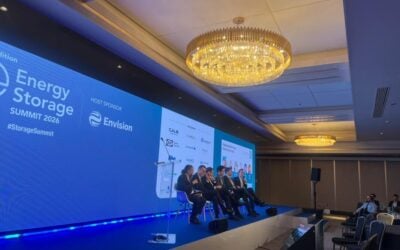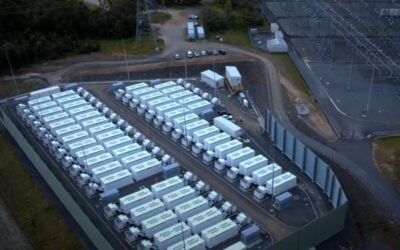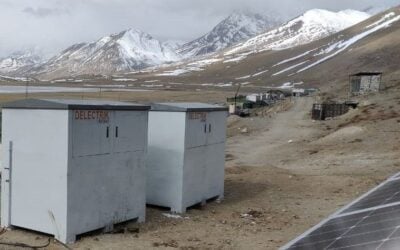Lendlease’s wood-wrapped civic centre project in Darling Square, Sydney, Australia. Image: Lendlease.
Property and infrastructure group Lendlease has signed a joint venture agreement (JVA) to deliver solar, battery storage and microgrid projects across Australia with Carnegie Clean Energy.
Multinational Lendlease has offices across four continents and its Australian subsidiary Lendlease Services employs over 3,000 people. It has created the 50/50 JV with Carnegie Clean Energy’s subsidiary Energy Made Clean, a solar PV and battery storage project developer it acquired in October. Carnegie was until last week traded on the Australian Stock Exchange (ASX) under its previous name Carnegie Wave Energy. The company has however changed its name and stock symbol, as well as suspending trading for a few days while it prepared the Lendlease announcement. Carnegie now claims it is ready to resume trading.
The JVA will execute engineering, procurement and construction (EPC) on projects all over Australia and together identify, bid for, secure and deliver projects. Energy Made Clean (EMC) hopes to gain better access to opportunities across the country through leveraging Lendlease’s nationwide footprint. This includes the National Electricity Market, which comprises around 40,000km of transmission lines and total electricity generation capacity of around 45,000MW.
EMC and Lendlease Services will work together for an initial three years, building on EMC’s track record of delivering microgrid, commercial scale solar and energy storage systems, including a 1.6MW PV array paired with 2.4MWh of battery energy storage systems (BESS) at a CSIRO (Commonwealth Scientific and Industrial Research Organisation)-led installation at the Australian Square Kilometre Array Pathfinder radio telescope in Midwestern Australia.
Try Premium for just $1
- Full premium access for the first month at only $1
- Converts to an annual rate after 30 days unless cancelled
- Cancel anytime during the trial period
Premium Benefits
- Expert industry analysis and interviews
- Digital access to PV Tech Power journal
- Exclusive event discounts
Or get the full Premium subscription right away
Or continue reading this article for free
Carnegie vanadium deal with major Japanese corporation
In related news, EMC also signed a strategic memorandum of understanding (MoU) with strategic metals company TNG (also ASX listed) and Japan’s Sumitomo Electric Industries (SEI) – builder of a 60MWh vanadium redox flow storage system in its homeland – for the promotion of vanadium redox flow batteries – as used for long duration energy storage – in Australia.
This includes raw materials supply, vanadium electrolyte from TNG’s Mount Peake project, containerised redox flow systems from SEI, while EMC will supply balance of systems components. TNG has succeeded in producing high-purity commercial grade vanadium from Mount Peake. TNG may also consider building a vanadium electrolyte production facility in Darwin or Perth.
“This strategic MoU represents a compelling three-way tie-up of an emerging miner, a manufacturer and an integrator to accelerate the development of a major new energy growth market,” EMC managing director John Davidson said.
The three companies will review all potential market opportunities for vanadium in Australia, as well as setting up a commercial-scale demonstration project. Their domestic competitors will include Redflow, an Australian company which along with commercial-scale systems has launched ZCell, a residential energy storage system based around vanadium redox flow batteries.





